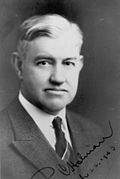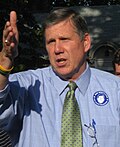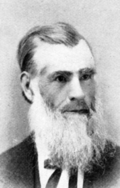| # | Image | Name | Party | Term |
|---|
| 1 |  | John D. Boon | Democratic | March 3, 1859 –
September 8, 1862 |
| 2 |  | Edwin N. Cooke | Republican | September 8, 1862 –
September 12, 1870 |
| 3 |  | Louis Fleischner | Democratic | September 12, 1870 –
September 14, 1874 |
| 4 |  | A. H. Brown | Democratic | September 14, 1874 –
September 9, 1878 |
| 5 |  | Edward Hirsch | Republican | September 9, 1878 –
January 10, 1887 |
| 6 |  | G. W. Webb | Democratic | January 10, 1887 –
January 12, 1891 |
| 7 |  | Phil Metschan | Republican | January 12, 1891 –
January 9, 1899 |
| 8 |  | Charles S. Moore | Republican | January 9, 1899 –
January 14, 1907 |
| 9 |  | George A. Steel | Republican | January 15, 1907 –
January 3, 1911 |
| 10 |  | Thomas B. Kay | Republican | January 4, 1911 –
January 6, 1919 |
| 11 |  | O. P. Hoff | Republican | January 6, 1919 –
March 18, 1924 [4] |
| 12 |  | Jefferson Myers | Democratic | March 18, 1924 –
January 4, 1925 [5] |
| 13 |  | Thomas B. Kay | Republican | January 4, 1925 –
April 29, 1931 [4] |
| 14 |  | Rufus C. Holman | Republican | May 1, 1931 –
December 27, 1938 [5] [6] [7] |
| 15 |  | Walter E. Pearson | Democratic | December 27, 1938 –
January 6, 1941 [5] |
| 16 |  | Leslie M. Scott | Republican | January 6, 1941 –
January 3, 1949 |
| 17 |  | Walter J. Pearson | Democratic | January 3, 1949 –
January 5, 1953 |
| 18 |  | Sig Unander | Republican | January 5, 1953 –
December 31, 1959 [7] |
| 19 |  | Howard C. Belton | Republican | January 4, 1960 –
January 4, 1965 |
| 20 |  | Robert W. Straub | Democratic | January 4, 1965 –
January 1, 1973 |
| 21 |  | James A. Redden | Democratic | January 1, 1973 –
January 3, 1977 |
| 22 |  | Clay Myers | Republican | January 3, 1977 –
April 1, 1984 [7] |
| 23 |  | Bill Rutherford | Republican | April 1, 1984 –
July 9, 1987 [5] [7] |
| 24 |  | Tony Meeker | Republican | July 9, 1987 –
January 4, 1993 [5] [6] |
| 25 |  | Jim Hill | Democratic | January 4, 1993 –
January 1, 2001 [8] |
| 26 |  | Randall Edwards | Democratic | January 1, 2001 –
January 4, 2009 |
| 27 |  | Ben Westlund | Democratic | January 5, 2009 –
March 7, 2010 [4] |
| 28 |  | Ted Wheeler | Democratic | March 9, 2010 –
January 1, 2017 [5] [6] |
| 29 |  | Tobias Read | Democratic | January 3, 2017 –
January 6, 2025 |
| 30 |  | Elizabeth Steiner | Democratic | January 6, 2025 –
present |
























